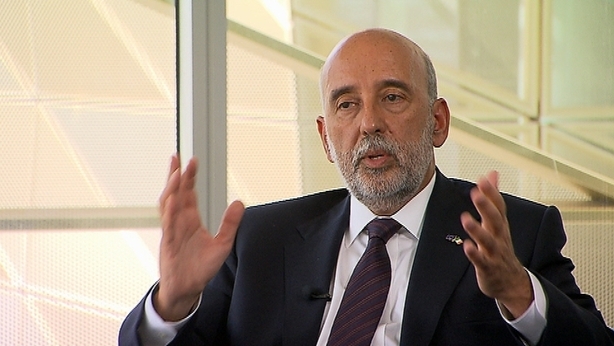The chief executive of the insurance industry's representative body has said there are genuine concerns about the sustainability of Ireland’s regulatory environment.
Moyagh Murdock said the Government and Central Bank need to assess the potential impact of regulation on competition.
"While the market continues to grow, there are genuine concerns about the sustainability of our regulatory environment and its ability to attract new additional investments into Ireland and to maintain Ireland’s competitiveness," she told attendees at the Insurance Ireland annual lunch.
"The increasing regulatory burden in Ireland and particularly any divergence from consistent EU regulatory approach is presenting threats to our future success."
"Insurance Ireland has raised with Government and the Central Bank the need to assess Ireland’s specific regulatory burden and the potential impact on competition."
Ms Murdock added that transparency, predictability and proportionality are crucial to maintaining existing providers and attracting new players into the market here.
The industry boss also said that the Government’s plan for an auto-enrolment pension scheme, while very much welcome, needs further consideration to prevent duplication of infrastructure.
She said the principles of the scheme outlined so far say the individual’s relationship will be with the central processing agency, and the role of four registered providers will be purely to act as fund manager to the agency
"This is likely to involve building a complex and costly infrastructure from scratch," she said.
"For decades life insurance companies have been providing pensions and planning for pensions in Ireland. They have a tried and tested infrastructure already in place which could be readily and cost effectively utilised to deliver cost effective auto-enrolment."
Ms Murdock added that the introduction of auto-enrolment as it stands is a missed opportunity to address the gender pension gap if it does not include amendments to or removal of the earnings thresholds.
However, Ms Murdock also praised progress on insurance reform, including the introduction of the new personal injury guidelines and their application by the Personal Injuries Assessment Board.
She said recent data showed the progress that had been made in bringing costs down in the motor market, with premium levels at the start of June equivalent to those last seen in June 2013.
"While inflationary pressures are a significant concern, I believe the trends over the last 18 months are clear evidence that the benefits are to be got from a joined-up approach," she claimed.
Ms Murdock also stated that the insurance industry will play its part in helping find solutions to climate change, but those solutions will require a collaborative approach.
"The transition towards a sustainable economy and society will need more than just our commitment," she told the audience.
"It will need a clear plan from Government on how to manage the change and how to identify concrete actions required."

Also addressing the gathering, the Governor of the Central Bank said the regulator expects insurers to be working hard towards the introduction of new regulations governing differential pricing by July 1.
Gabriel Makhlouf said the bank's most recent Consumer Protection Outlook Report outlined how poor practices may seek to exploit consumers’ behavioural vulnerabilities, with the widespread use of differential pricing in the motor and home insurance markets leading to consumers being charged for their loyalty.
Mr Makhlouf said higher rates of inflation are already affecting the cost of settling some non-life claims due to rising labour and material costs and this could impact profitability.
"The impact of inflation on liability policies presents the greatest risk to profitability levels as claims may be settled many years after the premiums are paid," he told the gathering.
"The adverse impact of inflation on some firms and on insurance costs may, however, be mitigated in part by the positive effects of higher interest rates on investment returns, alongside changes to the domestic personal injuries claims environment."
The Governor also highlighted how Central Bank work had identified areas where oversight of intra-group relationships in the insurance sector need to be strengthened by a number of firms.
"The risks associated with reliance upon related group entities are often not considered to a sufficient degree, perhaps due to intragroup arrangements being perceived by some as being 'less risky’ than external arrangements," he said.
On climate change, the Governor said central banks, including the Central Bank of Ireland, cannot solve the problem of climate change on their own.
"The challenge requires action on the part of the whole community, of businesses, households, and the entire financial system as well as policymakers," he said.
"The insurance industry is at the front end of physical risks and they really matter for the transition given the role in channelling savings to support investment."







